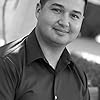Ask the Author: Chris Raiin
Answered Questions (3)
Sort By:

An error occurred while sorting questions for author Chris Raiin.
Chris Raiin
Read books on how to write (my favorites include Ayn Rand's "The Art of Fiction," Hallie Burnett's "On Writing the Short Story," and Orson Scott Card's "How to Write Science Fiction and Fantasy.")
Read books written in the 1700 and 1800s. They'll show you what's really possible with words. (I recommend Victor Hugo's "The Hunchback of Notre Dame," Alexandre Dumas' "The Count of Monte Cristo," and Mary Shelley's "Frankenstein.") Read contemporary books, too, to know what's trending and what you have to work with (that is, what you can be part of or deviate from). Avoid popular fiction novels (like the "Twilight" or "Hunger Games" series), but read one every now and then to understand why it’s popular. Look for award-winning fiction, especially the controversial stuff. (I recommend Junot Díaz's "The Brief Wondrous Life of Oscar Wao," Yann Martel's "Life of Pi," and Salman Rushdie's "Shame.")
Write every day, because, "Inspiration does exist, but it must find you working" (Pablo Picasso).
Read books written in the 1700 and 1800s. They'll show you what's really possible with words. (I recommend Victor Hugo's "The Hunchback of Notre Dame," Alexandre Dumas' "The Count of Monte Cristo," and Mary Shelley's "Frankenstein.") Read contemporary books, too, to know what's trending and what you have to work with (that is, what you can be part of or deviate from). Avoid popular fiction novels (like the "Twilight" or "Hunger Games" series), but read one every now and then to understand why it’s popular. Look for award-winning fiction, especially the controversial stuff. (I recommend Junot Díaz's "The Brief Wondrous Life of Oscar Wao," Yann Martel's "Life of Pi," and Salman Rushdie's "Shame.")
Write every day, because, "Inspiration does exist, but it must find you working" (Pablo Picasso).
Chris Raiin
My preferred technique is to write questions until the block gives way. For example, as I'm plotting a story, I might run into a block about what happens next or how to link one event to another. So, I'll write out my question on the page, right where I left off with plotting. Two questions from yesterday's writing were about backstory. I wrote, "What's the adventure? Why are they immortalized?" Without noticing it, I began answering the questions in the next paragraph of notes. Asking questions *and writing them down* does two things. First, it keeps me working--literally, it keeps me writing. Second, it helps me crystallize the *exact* issue I'm having. Some of my story prep notes have two or three lines full of questions, where each question is more specific than the last. Writing them out lets me see my train of thought, adding visual aid to my own mental processes. Most of the time, this method unblocks the block almost instantly. Other times, I finally figure out the question, and then I stop for the night. Now that I know the question, I let my subconscious work on it overnight and I begin the next day's writing by answering it. I get over writer's block by actively thinking--by writing out my questions until the question is clear and the answer flows from it. Oh, and long walks alone in the sunlight help, too.
Chris Raiin
I keep my "mental eyes" open. You know how you have random trains of thought throughout the day? I try to focus on my trains of thought, "watching" the random connections they make, and see if they lead to a conflict. Conflict is the germ of a story. Some trains of thought lead nowhere or end abruptly; some don't lead to a story until they return, randomly, a few days later; and some lead right to a plot, however incomplete it may be. Recently, I was having a conversation with my sister-in-law and the term "giclée" came up. A giclée is a detailed copy of a painting for resale. A small giclée featuring two wine barrels and blooming vines hangs in my office. The word—so odd and unique—bounced around in my head the rest of the day and I started writing a story from it two days later. You never know when or how inspiration will strike or how one thing leads to another, but I believe this is certain: "Inspiration does exist, but it must find you working" (Pablo Picasso). I "work" to keep my mental eyes open and paying attention, and I follow it up by sitting at my desk and freewriting until a coherent plot emerges from it. So…that's the long answer. Short answer: I get inspired to write by paying attention to the game of pinball going on in my head.
Chris Raiin
5 followers
About Goodreads Q&A
Ask and answer questions about books!
You can pose questions to the Goodreads community with Reader Q&A, or ask your favorite author a question with Ask the Author.
See Featured Authors Answering Questions
Learn more

